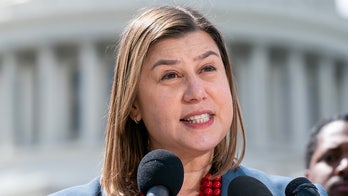The Senate is expected to begin the process Monday afternoon to trigger debate on the resolution prepared last week by the Foreign Relations Committee to authorize the use of force in Syria.
It is possible that actual debate on that resolution could begin Monday. But unlikely.
Here's what happens next:
The Senate meets at 2 p.m. ET Monday. It's possible Harry Reid could simply call up the resolution to the floor without any opposition and the debate begins. But top Senate leadership aides have not been planning for that. In order to call up the resolution, Reid must seek "unanimous consent" to do so. In other words, 99 senators may agree to start to debate on an issue. But if one doesn't "consent," they're blocked. A senator may do this by simply announcing an objection when Reid tries to bring the legislation to the floor for debate. Or, it's entirely possible that a senator or senators have informed the leadership beforehand they intend to object. Thus Reid may object himself or simply initiate a set of procedural maneuvers to get to the bill later in the week.
If there is an objection, Reid is blocked. So how does he get around this filibuster? He files what's called a "cloture petition." A cloture petition is a way to hurdle filibusters -- provided those wishing to halt the filibuster can get 60 yeas to do so. Reid would be expected to file the cloture petition Monday. By rule, cloture petitions don't ripen for two days. In other words, a cloture vote -- requiring 60 yeas -- can't happen until Wednesday.
It's possible Reid could go through these machinations early in the day, shortly after the Senate meets at 2 p.m. But it's more likely he may simply just talk about Syria and about what he plans to do during his opening remarks -- and save trying to call the resolution to the floor and filing the cloture petition until Monday night just before the Senate goes out of session. That would probably be sometime between 6 and 8 p.m.
So, here are the two scenarios:
1) Reid calls up the Syria resolution for debate. No one objects. Immediately, the Senate is on the resolution and the floor is open for debate. We're not anticipating this at all. But this is the Senate.
2) Reid knows an objection is coming. So he tries to call the resolution up asking "unanimous consent." The objection happens. So either then or later in the day, Reid actually files the cloture petition.
By the way, filing a cloture petition simply involves sending a piece of paper a few feet across the Senate chamber to the desk. Also, even if the Senate is not officially debating Syria, the floor may be open for senators to come talk about virtually anything. So it's highly likely they could discuss Syria on the floor -- even though they're not formally on the resolution.
So that takes us to Wednesday when the cloture petition on the motion to proceed on the Syria resolution is ripe for a vote.
This is important, because if they can't cobble together 60 votes, they can't even begin debating the actual resolution -- let alone a simple majority (51) to adopt such a resolution later in the week. As Reid told Fox News on Friday, "I think we're going to get 60 votes. It's a work in progress."
By rule, a cloture vote happens one hour after the Senate convenes on Wednesday. So probably 10 or 11 a.m. Most such votes take about 20 minutes. But it would not be surprising at all if Reid were to require all senators to actually sit at their desks and vote from there since this is such a big deal. That will make the vote go faster.
Moreover, it would not be surprising if Vice President Biden were to preside over the vote in his capacity as president of the Senate.
Regardless, during the vote, a clerk will orally read the names of each senator in alphabetical order. Each senator will rise and holler back either "yea/aye" or "nay/no." The clerk will then re-state how each senator voted.
If they fail to get 60 votes, the Syria resolution is dead in the water. They can't even bring the measure to the floor for debate.
If this happens, expect Reid to switch his vote at the last minute. Senate rules require a senator to vote on the "prevailing side" of a vote in order to call for a revote at some point in the future. In other words, if the nays prevail, even though Reid is a yea, he may switch his vote to be on the "prevailing side," thus making him eligible to call for a revote at some point in the future.
If they get 60 votes, cloture is adopted and they have cleared the first procedural hurdle. They can bring the Syria resolution to the floor -- but maybe not just yet.
By rule, once cloture is invoked, those against cloture are allowed 30 hours of real time to hold the floor. It's customary for most of those senators who failed to stave off cloture to immediately yield and allow the Syria bill (or any other bill) to come to the floor right away. But what will happen here is anybody's guess. Also, once the 30 hours expire, the Senate actually has to hold one more vote: the vote to proceed to the bill. But that is a fait accompli if cloture is invoked as that merely needs 51 yeas.
If opponents of debating the Syria resolution demand the 30 hours, that means the Senate probably can't start actual debate until late Thursday afternoon. In addition, everyone knows that senators will demand substantial time to actually debate the Syria authorization. So this isn't going to be over quickly if opponents require the 30 hours, post-cloture. Under most circumstances, Reid may just keep the Senate in session over the weekend with the hope being they could finish the debate by Sunday. But Yom Kippur comes at sundown on Friday (7:19 pm ET) and runs through Saturday at sundown. That blows out most of the weekend.
Then there's yet another wrinkle.
If Reid had to file cloture just to skip over the motion to proceed to bring the Syria resolution up, it's more than likely he would face a filibuster to end debate on the bill later. So that means he would have to file another cloture petition to stop the debate (presuming they can get it started). And like the first set of machinations, that petition also takes two days to ripen and needs 60 votes. The entire process could start all over again.
That means it is entirely possible this debate could bleed well into the week of Sept. 15.
What does this mean for the House of Representatives?
It is generally thought that the House might not even consider a Syria resolution if they struggle to move something through the Senate. That said, House Majority Leader Eric Cantor, R-Va., announced Friday that "Members should expect a robust debate and vote on an authorization of use of military force pertaining to Syria in the next two weeks."
So that easily punts this into the week of Sept. 15 in the House -- if at all.




